At the very first Republican primary debate last summer, Donald Trump boasted of his ability to curry favor with politicians by cutting big-dollar checks when they came calling. “I give to everybody,” the celebrity businessman declared when asked to explain his past donations to Hillary Clinton and other Democrats. “When they call, I give. And do you know what? When I need something from them two years later, three years later, I call them, they are there for me.”
Faced with an apparent example of him doing just that in an even more accelerated time frame, however, Trump now has a noticeably different take on the power of his political contributions. Via the Washington Post:
Donald Trump on Monday dismissed questions about his failure to disclose an improper $25,000 contribution in 2013 to a political group connected to Florida Attorney General Pam Bondi, who was at the time considering whether to open a fraud investigation against Trump University. …
“I never spoke to her, first of all. She’s a fine person, beyond reproach. I never even spoke to her about it at all. She’s a fine person. Never spoken to her about it, never,” Trump said Monday while campaigning in Ohio. “Many of the attorney generals turned that case down because I’ll win that case in court. Many turned that down. I never spoke to her.”
As with most things that come out of Trump’s mouth, his “never spoken to her” remark is difficult to parse. He could be saying he never discussed the donation to the pro-Bondi group And Justice for All—which would contradict a statement made earlier this summer by Bondi’s spokesman, who said that she personally solicited the donation from Trump—or that he simply never discussed the fraud investigation itself with the attorney general. As usual, his campaign is refusing to say.
Regardless, the timeline here is remarkable: Trump made the donation as Bondi’s office was considering whether to investigate fraud allegations against Trump’s now-defunct and always-misleadingly named Trump University. Bondi maintains that she was unaware of the complaints against the for-profit real-estate training program when she asked for the money. Nonetheless, a few weeks after the $25,000 donation was made, her office decided that it would not join the New York attorney general in investigating Trump U. That doesn’t prove quid pro quo—very few things do in our system—but it certainly creates the appearance of it.
The timing of the donation isn’t the only problem. The money came by way of the Donald J. Trump Foundation—not Trump himself—which was illegal since federal election law bars charities from donating to a political candidate or an affiliated group like Bondi’s. (This was hardly the first time that Trump blurred the lines between his personal bank account and that of the foundation he named after himself.) After the improper donation was discovered earlier this year, Trump paid a $2,500 fine to the IRS and, according to his organization, reimbursed the foundation the full $25,000 from his personal account—a resolution that appears to have also run afoul of election law. (Bondi’s PAC should have returned the money to the foundation, and then Trump could have made his personal donation if he wanted.)
But wait, there’s more: The Post discovered that Trump’s foundation failed to disclose the original gift to the IRS, instead reporting that it went to an unrelated group in Kansas with a similar name, Justice for All, which the foundation could legally contribute to. Trump’s team maintains that was a simple paperwork mistake—though, intentional or not, it effectively obscured the improper donation for years.
In recent months, a lot has been made of the overlapping interests of Hillary Clinton and the global elite that fund her family foundation. That’s a valid debate to have, and it’s always worth considering why a particular donor makes a particular donation, including Trump’s five-figure donation to Bondi. Trump is refusing to say why he did it—but, really, he’s been answering that question on the campaign trail for more than a year. Here he was, for instance, a few days before the first primary debate during an interview with the Wall Street Journal:
When you give, they do whatever the hell you want them to do.
And here he was earlier this year at a campaign rally in Iowa:
I’ve given to everybody, because that was my job. I’ve got to give to them, because when I want something I get it.
In Trump’s own telling, then, he doesn’t write a check without expecting something in return.
